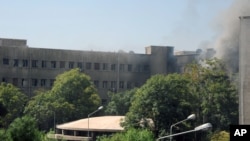CAIRO —
Syrian officials say four security guards died when a pair of explosions hit a military building in central Damascus Wednesday, leaving part of the building in flames. It was the third time in weeks that military headquarters have come under attack.
Plumes of black smoke poured into the sky of the Syrian capital as fire engulfed the top floors of the military's general staff headquarters. Nearby residents say the blasts broke windows and shattered plaster facades across central Damascus.
Witnesses say heavy volleys of gunfire could be heard for hours in the vicinity of Umayyad Square, where the blasts took place. Syrian state TV, which is located near the square, broadcast patriotic music shortly after the blasts but resumed normal programming soon after.
Syrian Information Minister Omran Zoubi blamed the attack on terrorists, a term the government uses for rebels and fighters opposed to President Bashar al-Assad. The rebel Free Syrian Army claimed responsibility for the attack.
The Syrian military said at least 14 people were wounded while four security guards died.
Government blames terrorists
A Syrian military spokesman told state TV that the “armed terrorists” set off two explosions, including a car bomb, causing damage to army headquarters. The spokesman said that “terrorists” opened fire randomly near the building in order to provoke panic among civilians, but that government forces chased them down.
Video clip of explosion
Syrian Information Minister Zoubi denounced what he called “rumors” and “allegations” on Arab satellite channels, saying instead the blasts had caused little damage.
Pro-government news agencies showed video of Syrian security forces firing into the air in what they say were “celebrations” after they regained control of the area. Some reports say defecting soldiers inside the building traded fire with loyalists after the initial blasts.
Opposition activist Rami Abd al-Rahman told Alhurra TV that many ambulances were heard rushing to the scene, indicating that there were heavy casualties. He said the attack is significant.
Al-Rahman said the attack was an important strategic blow to the government since rebels struck the heart of the regime's military command structure, although it was less important than an attack in July which killed killed Syria's sitting defense minister and three other top security officials.
Regime under siege
Khattar Abou Diab, who teaches political science at the University of Paris, said the attack on military headquarters indicates that time is running out on Mr. Assad's regime.
Abou Diab said that despite some claims that Mr. Assad has gained time because his forces are better armed, the situation is deteriorating, as witnessed by the rebels being able to attack nerve centers of the regime.
Iran's Press TV said one of its correspondents was killed by sniper fire and the Damascus bureau chief for another state-run news organization was injured Wednesday as they reported on the bombings.
The explosions are the latest to hit the capital during the country's 18-month conflict, following a bombing Tuesday at a building occupied by pro-government militias. Rebels said they hoped that attack would kill top-level security officials.
Plumes of black smoke poured into the sky of the Syrian capital as fire engulfed the top floors of the military's general staff headquarters. Nearby residents say the blasts broke windows and shattered plaster facades across central Damascus.
Witnesses say heavy volleys of gunfire could be heard for hours in the vicinity of Umayyad Square, where the blasts took place. Syrian state TV, which is located near the square, broadcast patriotic music shortly after the blasts but resumed normal programming soon after.
Syrian Information Minister Omran Zoubi blamed the attack on terrorists, a term the government uses for rebels and fighters opposed to President Bashar al-Assad. The rebel Free Syrian Army claimed responsibility for the attack.
The Syrian military said at least 14 people were wounded while four security guards died.
Government blames terrorists
A Syrian military spokesman told state TV that the “armed terrorists” set off two explosions, including a car bomb, causing damage to army headquarters. The spokesman said that “terrorists” opened fire randomly near the building in order to provoke panic among civilians, but that government forces chased them down.
Video clip of explosion
Syrian Information Minister Zoubi denounced what he called “rumors” and “allegations” on Arab satellite channels, saying instead the blasts had caused little damage.
Pro-government news agencies showed video of Syrian security forces firing into the air in what they say were “celebrations” after they regained control of the area. Some reports say defecting soldiers inside the building traded fire with loyalists after the initial blasts.
Opposition activist Rami Abd al-Rahman told Alhurra TV that many ambulances were heard rushing to the scene, indicating that there were heavy casualties. He said the attack is significant.
Al-Rahman said the attack was an important strategic blow to the government since rebels struck the heart of the regime's military command structure, although it was less important than an attack in July which killed killed Syria's sitting defense minister and three other top security officials.
Regime under siege
Khattar Abou Diab, who teaches political science at the University of Paris, said the attack on military headquarters indicates that time is running out on Mr. Assad's regime.
Abou Diab said that despite some claims that Mr. Assad has gained time because his forces are better armed, the situation is deteriorating, as witnessed by the rebels being able to attack nerve centers of the regime.
Iran's Press TV said one of its correspondents was killed by sniper fire and the Damascus bureau chief for another state-run news organization was injured Wednesday as they reported on the bombings.
The explosions are the latest to hit the capital during the country's 18-month conflict, following a bombing Tuesday at a building occupied by pro-government militias. Rebels said they hoped that attack would kill top-level security officials.




